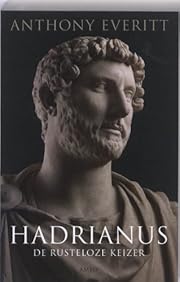

Click on a thumbnail to go to Google Books.
|
Loading... Hadrianus : de rusteloze keizer (original 2009; edition 2010)by Anthony Everitt
Work InformationHadrian and the Triumph of Rome by Anthony Everitt (2009)
 None No current Talk conversations about this book. Being a life-and-times treatment of Rome's great emperor Hadrian and the factors which brought his to the throne. The book is discursive to a fault, especially at the start of the book. For about the first third of the book we hear nearly nothing about Hadrian, which would be all right if the author, who is quite competent, were a bit more liberal with striking insight or superlative prose. Eventually, as this subject becomes prominent and his life better-documented, the book is enjoyable and informative. Not nearly as good as his biography as Cicero, maybe because this book was not meant to be a biography. It tells the history of Rome from Vespasian through Hadrian, with about half of the book being focused on Hadrian's rule. Unfortunately, the underlying sources are relatively sparse and the book is filled with perhaps and maybes that link Hadrian to the world and events of his time. You don't feel like you know Hadrian and to the degree you do he doesn't seem particularly complex or interesting, unlike Cicero. That said, overall the book presents a good history of the Roman empire at it's peak -- about 50-150 years after the well chronicled period of the end of the Republic and first series of Emperors. The portrait of that time through the lens of a relatively tranquil and consolidation period was interesting and worth reading -- although lacking in the drama and excitement of the end of the Republic. A perfectly serviceable biography of Hadrian, but one that is hampered by the paucity of hard evidence about the emperor's early life and career. Well written and researched, but simply due the subject and available evidence, not as comprehensive or engaging as some of Everitt's other works. Still worth reading, if you're interested in the period. no reviews | add a review
Acclaimed British historian Anthony Everitt delivers a compelling account of the former orphan who became Roman emperor in A.D. 117 after the death of his guardian Trajan. Hadrian strengthened Rome by ending territorial expansion and fortifying existing borders. And-except for the uprising he triggered in Judea-his strength-based diplomacy brought peace to the realm after a century of warfare. No library descriptions found. |
Current DiscussionsNonePopular covers
 Google Books — Loading... Google Books — Loading...GenresMelvil Decimal System (DDC)937.07092History & geography History of ancient world (to ca. 499) Italian Peninsula to 476 and adjacent territories to 476 Constitutional 31 B.C.-284 A.D.LC ClassificationRatingAverage: (3.62) (3.62)
Is this you?Become a LibraryThing Author. |
||||||||||||||||||||||||||||||||||||||||||||||||||||||||||||||||||||||||||||||||||||||||||||||||||||||||||||||||||||||||||||||||||||||
That said, overall the book presents a good history of the Roman empire at it's peak -- about 50-150 years after the well chronicled period of the end of the Republic and first series of Emperors. The portrait of that time through the lens of a relatively tranquil and consolidation period was interesting and worth reading -- although lacking in the drama and excitement of the end of the Republic. (